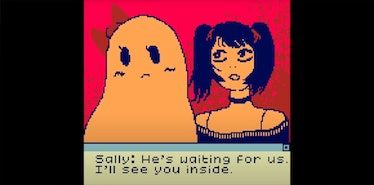Several months after first coming out as transgender to my parents, I was on vacation with my family. I had made the trip from New York to California with the intent of finally coming out to my siblings. When I began a conversation with my mother to let her know this was my plan, she first responded by saying, “So you are still sure about this transgender thing?”
Half an hour into He Fucked the Girl Out of Me, protagonist Ann describes the pain of holding every horrible feeling inside of her and how hard it is to reach out to those around her, including her mother. When it becomes so hard for Ann to hide her pain, her mother notices and matter-of-factly asks, “It’s the transsexual thing, isn’t it?”
It’s a moment that brings me to tears, no matter how many times I play this short adventure game from developer Taylor McCue. And so much of this game has that effect on me. Tears of anger, sadness, disgust, and understanding.
He Fucked the Girl Out of Me is a transcendent experience that is achingly personal, putting its creator’s heart on display for the world. There is no sense of accomplishment or joy that HFTGOOM will bring to players because it understands that those notions are limiting to what games can be. It confronts difficult subject matter in a way that only video games can, and is one of the greatest arguments for the worth and artistic potential of this medium.
A Delicate Balance
To talk about HFTGOOM requires ample warning. The game’s Steam page — as well as the opening screen of the game itself — comes with a long list of trigger warnings that give a picture of just how dark and disturbing this game’s subject matter is. And while so often the attempt to tackle “mature themes” comes across as prestige bait (looking at you, 12 Minutes and As Dusk Falls), HFTGOOM presents everything with cold honesty.
That’s because HFTGOOM is something of an anomaly. It can be described factually as a visual novel / light adventure game made in the pixel-art style of the Game Boy Color that runs roughly 40 minutes. But at its core, HFTGOOM is video game as memoir or creative nonfiction. In a March 2023 interview with Game Developer, McCue describes it as a semi-autobiographical game about her own experiences with sex work, transitioning, depression, and isolation.
The lo-fi presentation is disorienting and off-putting due to how many things are happening at once. Its retro aesthetics are diametrically opposed to the idea of what kind of game would be on a Nintendo platform back in the ‘80s or ‘90s, instead tackling some of the heaviest themes in any game I have played. Everything about the game is captivatingly at odds with itself. Cute sprites like ghosts wander the landscapes, only to suddenly start masturbating.
HFTGOOM shifts form so many times in its short runtime that the player can never feel a sense of comfort. Which is the point. None of this is comfortable, it is actively uncomfortable — that, in turn, makes you fully aware that none of this is meant to be easy to swallow.
Cost of Living
Ann’s journey centers around a reality that many transgender women have experienced, the need to do sex work to become yourself. It funds the constant cost of being trans that includes (but is not limited to) buying hormones, surgeries, and an entire new wardrobe of clothes. Ann is pulled into this life by her friend Sally, but as the game’s reflective text often asks – how could someone who claims to love you help you do things that tear you apart?
It’s important to note that this game isn’t a sweeping commentary on the complicated issue of sex work and its ethics on the whole, it is a memoir, so everything is the personal experience of Ann (and by extension McCue).
While sex work is a necessary means to an end here, along the way Ann finds herself losing that identity. It makes Ann compartmentalize herself and shut down into a lonely creature. The point of all this is to give Ann a life worth living, but in the moment, there is no life worth living. After a chain of horrifying experiences, she finds herself retreating away from her trans identity.
One especially memorable section of HFTGOOM consists of a short run to a convenience store in which the player is invited to pick out snacks and drinks to buy. All of these come with a cost, but for Ann, that is no longer a dollar amount. Everything is measured in actions needed or debts owed through sex work.
Next to Normal
As a game, HFTGOOM faces many obstacles. It’s queer, it’s short, and it’s an unflinching depiction of dark themes, including sex. Is it fun? Not particularly! But it’s utterly unforgettable, in a way that only the greatest of games can match.
The game has been relegated to the adult section of Steam, meaning that it will be lumped in with endless games about sexual gratification. Unlike a medium more conscious of its value as art such as film, where most people are not likely to lump together a movie that attempts to tackle a nuanced understanding of sex with porn, the gaming marketplace struggles to make that distinction.
Great art isn’t about trying to speak to the largest audience. It is about selflessly tearing pieces of yourself off and sending them into the world to be seen by others — with no guarantee that anybody will resonate with them. It is the desperate hope that while your experience is personal, others will accept you for who you are and what your art says. The openness of HFTGOOM is an exercise in radical healing for someone who has gone through Ann’s experience of being forced to close themselves off.
He Fucked The Girl Out of Me deserves to be seen for what it is – a work of art.
10/10
He Fucked The Girl Out of Me is available now for PC via Steam and Itch.io.
INVERSE VIDEO GAME REVIEW ETHOS: Every Inverse video game review answers two questions: Is this game worth your time? Are you getting what you pay for? We have no tolerance for endless fetch quests, clunky mechanics, or bugs that dilute the experience. We care deeply about a game’s design, world-building, character arcs, and storytelling come together. Inverse will never punch down, but we aren’t afraid to punch up. We love magic and science-fiction in equal measure, and as much as we love experiencing rich stories and worlds through games, we won’t ignore the real-world context in which those games are made.





